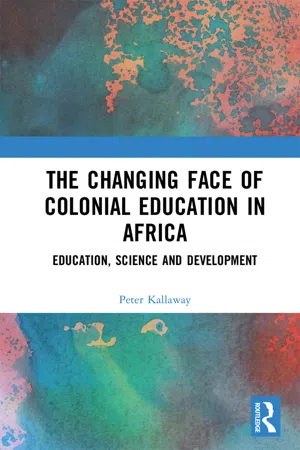
The Changing face of Colonial Education in Africa
Education, Science and Development
- 262 pages
- English
- ePUB (mobile friendly)
- Available on iOS & Android
About This Book
The Changing Landscape of Colonial Education in Africa offers a detailed and nuanced perspective of colonial history, based on fifteen years of research, that throws fresh light on the complexities of African history and the colonial world of the first half of the twentieth century. It provides an analytical background to history of education in the colonial context by balancing contributions by missionary agencies, colonial government, humanitarian agencies, and scientific experts.
The book offers a foundation for the analysis of modern educational policy for the post-colonial state. It attempts to move beyond clichés about colonial education to an understanding of the complexities of how educational policy was developed in different places at different times while giving credence to arguments which see schooling as a form of social control in the colonial environment.
The book will be essential reading for academics, researchers and policy makers looking to better understand colonial education and contextualise modern developments related to the decolonising African education. It is intended to provide an essential background for policy makers by demonstrating the significance of a historical perspective for an understanding of contemporary educational challenges in Africa and elsewhere.
Frequently asked questions
Information
Chapter 1
The International Missionary Council and education in colonial Africa*
History of education and mission education
Table of contents
- Cover
- Half Title
- Title
- Copyright
- Dedication
- Contents
- List of tables
- Appendices
- Foreword
- Acknowledgments
- Abbreviations
- Introduction: The genesis of educational policy in late colonial Africa: 1900–1950s
- 1 The International Missionary Council and education in colonial Africa
- 2 Conference litmus: the development of a conference and policy culture in the interwar period with special reference to the New Education Fellowship and British colonial education in Southern Africa
- 3 Welfare and education in British colonial Africa: 1918–1945
- 4 Science and policy: anthropology and education in British colonial Africa during the interwar years
- 5 Diedrich Westermann: linguistics and the ambiguities of Colonial Science in the interwar era
- 6 Donald Guy Sydney M’timkulu: South African educationalist: 1907–2000
- 7 The modernization of tradition? isiXhosa language education and school history: 1920–1948 – reform in the work of Samuel Edward Krune Mqhayi
- Conclusion
- References
- Index